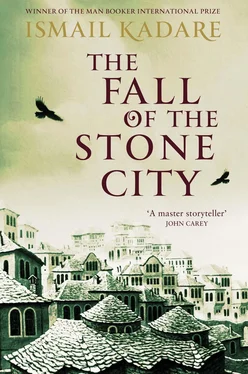The Germans must have gained something during the course of their conversation but nobody knew if they had indeed extracted names or had been palmed off with nicknames. Some thought that they might have been sold a mixture of names and nicknames, just as wheat is sometimes bought with chaff.
However the matter was threshed out, there was no avoiding the truly central question: quite apart from the matter of names and nicknames, did this ploy of Big Dr Gurameto’s represent treason or not?
Everybody knew that the two sides in this debate would never agree in a thousand years and would both be at odds with a third group of more cautious people, of whom there are always plenty, who took the view that it was hard for the uninitiated to judge those with inside knowledge, or for insiders to judge outsiders and so on. Then they would lose the thread again until a voice piped up, “So what’s really going on in there?”
The scene was imagined in two ways. In one, a merry and indeed tipsy Dr Gurameto, at ease in this world of pseudonyms, held a glass of champagne. The alternative version also included Gurameto but this time grim-faced, dramatically handcuffed and with a revolver at his head. Meanwhile the other Dr Gurameto, the little one, was lying low, trembling like a mouse.
Another handful of hostages was released and they too scattered like ghosts. Again whispers went round. “No celebrations, don’t make a sound, don’t rejoice too soon!” Inevitably people started totting up how many had been freed and how many remained. With astonishing mental agility they calculated the number of hostages that might be released in exchange for one name and how many for a nickname. Of course nicknames were a weak currency compared to real names, rather like ordinary francs compared to gold francs.
When the third and largest batch of hostages was released all at once, most people were of the opinion that either the Germans really had lost their wits, or Dr Gurameto’s treason had gone beyond all bounds. Meanwhile the latter’s admirers, though fewer in number, were so fervent that they claimed not only that Dr Gurameto was the greatest liberator of hostages in history but that in the course of the dinner his appointment as governor of Albania had arrived directly from Berlin. Only this, and not treachery, could explain the miracle that was taking place. These admirers asserted that there might be some truth in the image of a revolver against a head, but it would be the other way round, with Dr Gurameto holding a gun to the colonel’s head as he issued the order, “Fritz, release the hostages!”
But ancient scripture warns against rejoicing too soon and just as the hope blossomed that the last of the hostages would be freed before midnight, it was cut down as if by the stroke of a knife. A curt, cold order was issued at the gate of the house from which the music of the gramophone boomed. “Stop! Halt!” the Germans said. “We’ve done enough for this city. German magnanimity, the Nibelungenlied , Beethoven and so forth has its limits, and so does mercy. We have never before done so much for anyone! Enough!”
The Albanians looked for the reason for the Germans’ sudden change of heart among their own past sins. These included their abductions of women (it was believed that each time this happened, a spring ran dry); their periodic incursions into Greece, with all the drums and dudgeon of war, which left only grief and ashes behind. The sacking of the city of Voskopojë, although it happened so long ago, had to be counted among these sins. Finally there were the imperial judges, in whose strongboxes, alongside their silver watch chains, lay ancient court judgments with terrible sentences.
These were their visible sins, startling and gross, but more corrosive than these were their secret, inward falls from grace. The white fancywork, lace and drapery of the old houses sometimes, instead of inspiring admiration, made your flesh creep: it was hard to forget all those memories of incest, dishonoured brides and old people smothered under the awnings of the great verandas.
All these things were recalled to mind but quickly dismissed, until the real snag was hit upon: Jakoel the Jew. Had they really not known this all along or had they pretended that by banishing him from their minds he would be lost in the crowd?
Nothing suggested that the Germans were aware that a special fish had been netted in their catch of hostages, but one could still imagine the tense conversation between Big Dr Gurameto and Fritz von Schwabe on that night across the dinner table.
“Dr Gurameto, you’ve broken your word. There is a Jew here.”
“A Jew? So what?”
“So what? You know I can’t release Jews.”
“Jews, Albanians, it’s all the same.”
“It’s not the same, Gurameto, not at all.”
“Albanians do not betray their guests. You know that, Fritz. This Jew is a guest in our city. We can’t hand over a guest.”
“Because the Kanun of Lekë Dukagjini forbids it?”
“I told you this long ago in the tavern. It’s been our law for a thousand years.”
The colonel paused doubtfully then shook his head. “In that case Lekë Dukagjini is an enemy of the Reich. I will release them all, but not the Jew.”
“No.”
“Yes.”
“We talked about it in the tavern,” said Gurameto in a muffled voice. “But if you’re not the same man as then. . ”
These words struck more terror in the colonel than a bolt of lightning.
“Dr Gurameto, do you think I’m not the same man?”
The two stared at each other with cold determination.
“I don’t doubt it,” said Gurameto wearily. “You are the same man as you were then.”
Fritz von Schwabe breathed more easily.
Time was passing.
In the darkness, on the city square, the forty remaining hostages shivered in the cold. Among them, the Jew Jakoel felt the cold most of all. He was on the brink of telling the others to hand him in to save themselves, but his lips would not form the words. All around him was silence and calm. For the first time in many years the nationalists, royalists and communists, who had been at odds over everything else for years, were of the same mind concerning this Jew. Jakoel wanted to weep but the tears would not come.
The discussion in Dr Gurameto’s house petered out. Only the gramophone continued its din. The guests looked first at the colonel and then at the doctor, not understanding what was happening. It was as if a dense fog had descended. The rumour was that a second order had just arrived from Berlin, annulling Big Dr Gurameto’s appointment as governor and restoring his powers to Fritz von Schwabe.
The colonel himself stood up to change the gramophone record. He put on Schubert’s “Death and the Maiden” and everybody realised there was no more hope. And so they sat for a long time, waiting for the rattle of machine guns.
The first cocks crew. A superstition claimed that they drove away ghosts.
The doctor and the colonel muttered to each other in private for a long time and again the situation changed. Nobody explained why. Colonel Fritz von Schwabe, bearer of the Iron Cross, took a deep breath and ordered the hostages to be freed. Not just some, but all of them.
The tension relaxed and it was as if the dinner were starting again. Dr Gurameto’s sweet-natured daughter, her chestnut hair combed in the latest fashion, carried in a tray with glasses to celebrate the agreement. All the guests had seen how beautiful she was, even if they had pretended to take no notice. One after another they had fallen in love with her, passionately, as war-weary men do. And she had fallen in love with them. Faced for the first time with such a dense crowd of dangerous masculinity, all men of chivalry, intimate with death, she had fallen suddenly, tremulously in love with them, as if here in this room the men would fill the great emptiness of the future. Her hands trembled as she passed round the drinks to the colonel, then to her father, her mother and to the others in turn and finally, with a slight hesitation, to her fiancé.
Читать дальше












